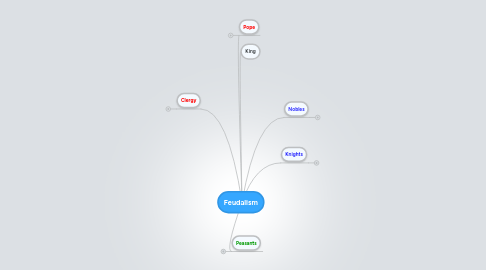
1. Peasants
1.1. Rights
1.1.1. Bound to the land
1.1.2. Taxed on grain and marriage
1.1.3. Marriage had to be approved
1.1.4. Owed a tithe to the priest
1.2. Enviornment
1.2.1. Small and crowded cottages
1.2.2. Warmed cottage with pigs
1.2.3. Dirt floors
1.2.4. Straw, bug invested, beds
1.3. Responsibilites
1.3.1. Tended to the lord's lands
1.3.2. Cared for animals
1.3.3. Maintained estate
1.3.4. Worked a few days a week
2. Clergy
2.1. Rights
2.1.1. Allowed to enforce church law
2.1.2. Freedom of living (not bound to the land)
2.1.3. Education
2.2. Enviornment
2.2.1. Many lived in luxury
2.2.2. Lifestyle gave them higher job opp.
2.2.3. Lived comfortably
2.3. Responsibilites
2.3.1. Administer sacraments
2.3.2. Absolve the people of their sins
2.3.3. Secular and ecclesiastical pronouncements
2.3.4. Settled church disputes
3. King
4. Pope
4.1. Rights
4.1.1. Could excommunicate rulers
4.1.2. Could interdict rulers
4.1.3. Could appoint rulers
4.1.4. Rule for life
4.2. Enviornment
4.2.1. Wealthy
4.2.2. Lived in a large castle
4.2.3. Lived in luxury
4.3. Responsibilites
4.3.1. Give spiritual guidance
4.3.2. Lead masses
4.3.3. Interpret the bible
5. Nobles
5.1. Rights
5.1.1. Free in person and possesions
5.1.2. Lord of all people on his land
5.1.3. Could coin money
5.1.4. Own courts of justice
5.1.5. Military obligation to lord
5.2. Enviornment
5.2.1. More fighting=more luxuries
5.2.2. Lavish life style
5.2.3. Hired stewards to watch land
5.3. Responsibilites
5.3.1. Raise troups
5.3.2. Command troops in battle
5.3.3. Protect weak and poor
5.3.4. Look over his land
6. Knights
6.1. Rights
6.1.1. Fiefs for fighting
6.1.2. Not bound to the land
6.1.3. Right of ransom
6.1.4. Given education
6.2. Enviornments
6.2.1. In battle had disgusting food
6.2.2. Lived in or near castle
6.2.3. Lived under their lord
6.3. Responsibilites
6.3.1. Defend lord's land
6.3.2. Battled-mounted horsemen
6.3.3. Show chivarly attributes
